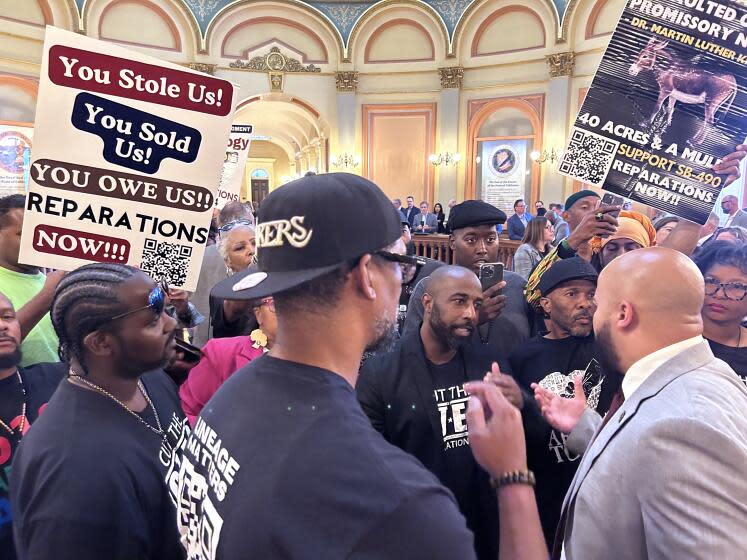(Yahoo) Gov. Gavin Newsom and California lawmakers in 2020 touted a law to create a “first in the nation” state task force to study and propose remedies to atone for the legacy of slavery.
Four years later, their work to deliver reparations is more incremental than recording-breaking, stoking frustration among advocates who filled the Capitol as lawmakers cast their final votes of the legislative session on Saturday.
Hamstrung by a state budget deficit and the challenges of supporting a politically volatile issue in an election year, the California Legislature passed a limited slate of reparations bills. The meager progress, though hailed by some lawmakers and advocates, in a state as liberal as California could serve as a warning on the issue to the rest of the nation.
“I think what it demonstrates is that when the rubber hits the road, Democrats are still unwilling and unable and uninterested in truly supporting these efforts outside of sort of symbolic and less than substantive ways,” said Tatishe Nteta, provost professor of political science at the University of Massachusetts Amherst and director of the UMass poll.
The California Legislative Black Caucus announced 14 priority reparations bills in January based on recommendations made last year by the reparations task force. Lawmakers cast the legislation as a first step focused largely on enacting policy changes in education, healthcare and criminal justice, while omitting cash payments in light of the state’s financial troubles.
Lawmakers passed 10 bills in the package before they adjourned Saturday, including marquee legislation requiring a formal apology from the state for “perpetuating the harms African Americans faced by having imbued racial prejudice through segregation, public and private discrimination, and unequal disbursal of state and federal funding and [declaring] that such actions shall not be repeated.”
The Legislature placed a measure on the November ballot that asks voters to delete language in the California Constitution that allows involuntary servitude as a form of punishment for crimes. Another bill would end a work requirement for able-bodied state prisoners and instead develop a voluntary work program if the ballot measure banning involuntary servitude is approved.
Other bills establish a process for the state to review and investigate claims of racially motivated taking of property by governments using the power of eminent domain, seek to increase and track participation in career training education among Black and low-income students, and expand Medi-Cal coverage, pending federal approval, to include benefits for medically supported food and nutrition.
The legislation now on Newsom’s desk also includes new oversight of book bans in California prisons, a requirement that grocery stores and pharmacies give written notice at least 45 days before closing and the expansion of a state law prohibiting discrimination based on hairstyle to include youth sports.
Bills faltered in the Legislature that sought to restrict solitary confinement in prisons, to prioritize African American descendants of people who were enslaved in the United States for state licenses and to establish grants to fund local efforts to decrease violence in Black communities. A proposal to amend the state constitution to allow funding for programs that increase life expectancy, improve educational outcomes and alleviate poverty among certain racial and ethnic groups of people also failed.
Assemblymember Lori D. Wilson (D-Suisun City), who leads the Legislative Black Caucus, said that work on reparations will continue next year and that the successful bills marked an important first step.
“It was definitely intentional to start laying a foundation,” she said. “We look forward to building on top of that and being able to really engage the community on the work that we’re doing.”






